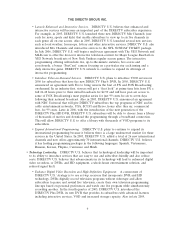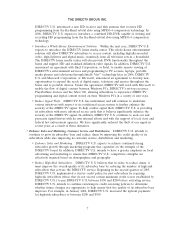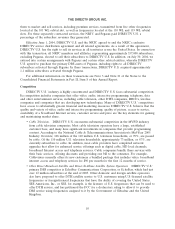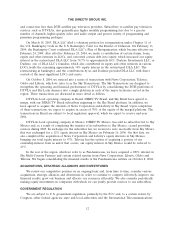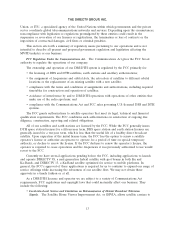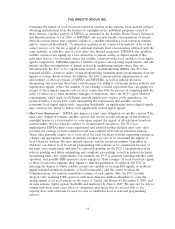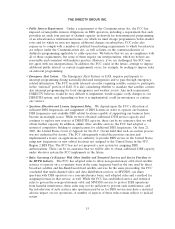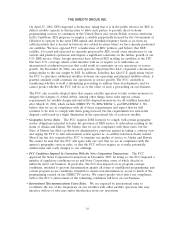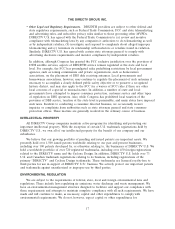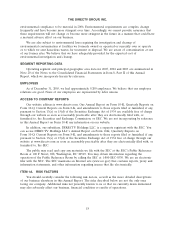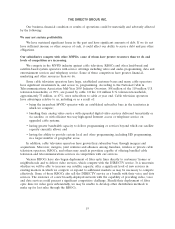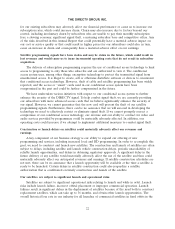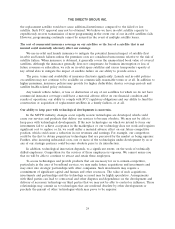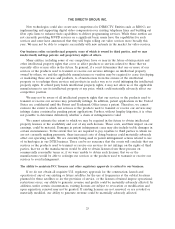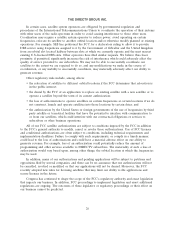DIRECTV 2005 Annual Report Download - page 29
Download and view the complete annual report
Please find page 29 of the 2005 DIRECTV annual report below. You can navigate through the pages in the report by either clicking on the pages listed below, or by using the keyword search tool below to find specific information within the annual report.THE DIRECTV GROUP, INC.
On April 25, 2002, SES requested a declaratory ruling that it is in the public interest for SES to
deliver satellite capacity to third parties to allow such parties to provide direct-to-home
programming services to consumers in the United States and certain British overseas territories
in the Caribbean. SES proposes to employ a satellite purportedly licensed by the Government of
Gibraltar to operate in the same DBS uplink and downlink frequency bands as us, from an
orbital position that is located in between two orbital locations where we have already positioned
our satellites. We have opposed FCC consideration of SES’ petition, and believe that SES’
satellite, if located and operated as currently proposed by SES, would cause interference to our
current and planned operations and impose a significant constraint on the further growth of our
U.S. DBS service. Other foreign operators have followed SES in filing for satellites at the ITU
that have U.S. coverage, which could interfere with us or require us to undertake an
international coordination process that could result in constraints on our operations or service
growth. On December 28, 2004, one such operator, Spectrum Five LLC, requested a declaratory
ruling similar to the one sought by SES. In addition, EchoStar has filed U.S. applications before
the FCC to introduce additional satellites between our operating and planned satellites which, if
granted, similarly could constrain our operations or service growth. The FCC currently is
considering whether to hold a rulemaking proceeding to address these developments, and we
cannot predict whether the FCC will do so or the effect of such a proceeding on our business.
The FCC also recently adopted rules that require satellite operators to take certain measures to
mitigate the dangers of orbital debris. Among other things, these rules impose certain
requirements for satellite design and end-of-life disposal maneuvers for all satellites launched
after March 18, 2002, which include DIRECTV 7S, SPACEWAY 1, and SPACEWAY 2. We
believe that we are in compliance with all of these requirements and expect that we will
continue to be able to comply with them going forward, but the requirements for end-of-life
disposal could result in a slight diminution in the operational life of each new satellite.
•Geographic Service Rules. The FCC requires DBS licensees to comply with certain geographic
service obligations intended to foster the provision of DBS service to subscribers residing in the
states of Alaska and Hawaii. We believe that we are in compliance with these rules, but the
State of Hawaii has filed a petition for administrative sanctions against us taking a contrary view,
and urging the FCC to take enforcement action against us. A satellite television dealer named
MicroCom has also requested the FCC to examine our quality of service to Alaska and Hawaii.
We cannot be sure that the FCC will agree with our view that we are in compliance with the
agency’s geographic services rules, or that the FCC will not require us to make potentially
cumbersome and costly changes to our offerings.
•FCC Conditions Imposed In Connection With the News Corporation Transactions. The FCC
approved the News Corporation transactions in December 2003. In doing so, the FCC imposed a
number of regulatory conditions on us and News Corporation, some of which directly or
indirectly affect our business. In particular, the FCC has imposed on us program carriage
conditions, intended to prevent discrimination against all forms of unaffiliated programming; and
certain program access conditions, intended to ensure non-discriminatory access to much of the
programming carried on the DIRECTV service. We cannot predict what effect our compliance
with or the FCC’s enforcement of the remaining conditions will have on our business.
•International Telecommunications Union Rules. We are required by international rules to
coordinate the use of the frequencies on our satellites with other satellite operators who may
interfere with us or who may suffer interference from our operations.
16


